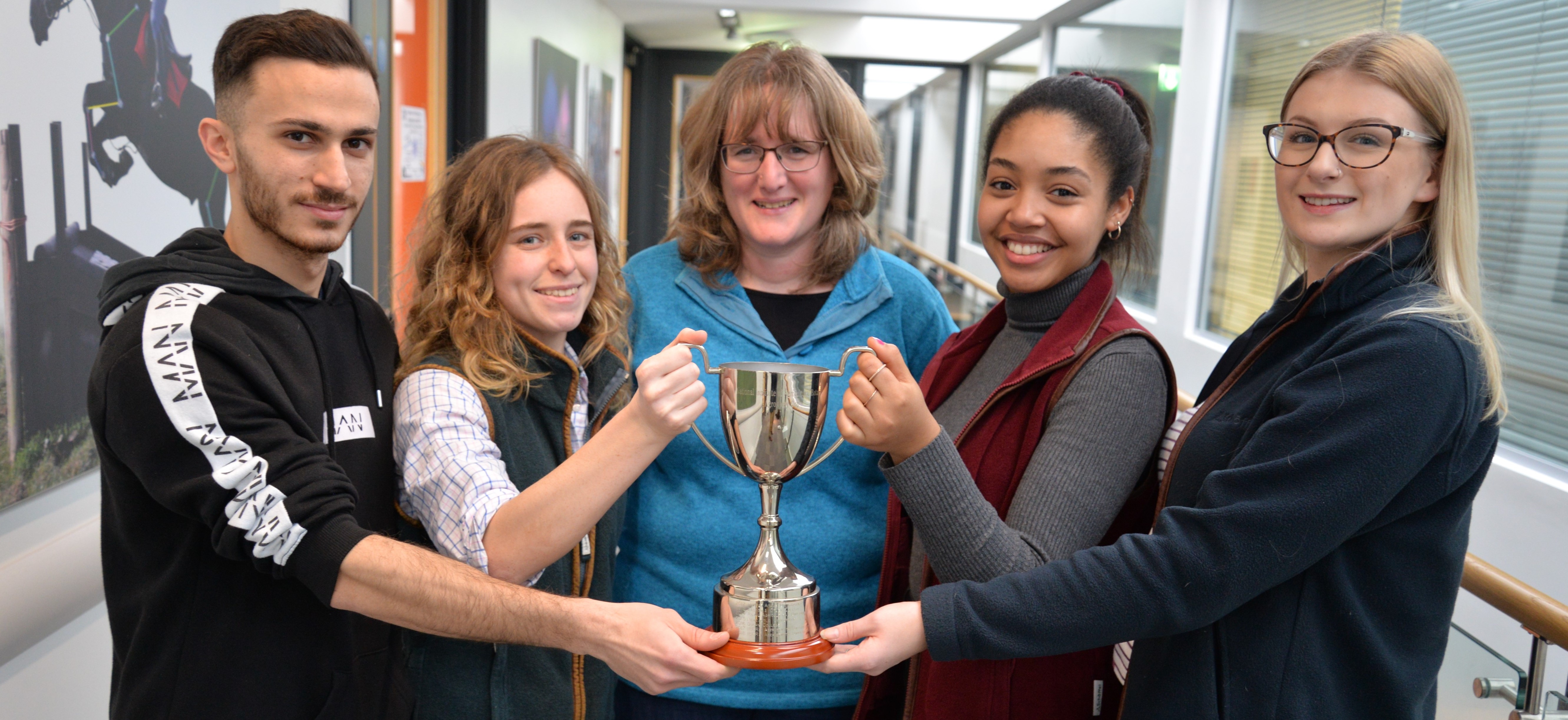Aberystwyth students win NIAB Agronomy Cup for the third time

Left to right: The winners of the 2019 NIAB Agronomy Cup Yiannos Constantinou, Danika Lustle, Courtney Ifill and Summer de Slegte with lecturer Dr Irene Griffiths (centre).
05 March 2020
One of the UK’s leading competitions for agriculture and crop science students has been won for the third year running by Aberystwyth University.
Established in 2012, the prestigious NIAB (The National Institute of Agricultural Botany) Agronomy Cup tests team’s agronomy, farm management and agricultural decision-making skills.
The competition saw teams sow a crop of winter wheat in the autumn of 2018 at the NIAB Callow site in Herefordshire which was harvested in August 2019.
BSc Agriculture students Danika Castle, Courtney Ifill, Summer De Slegte and Yiannos Constantinou are the latest to represent Aberystwyth University’s Institute of Biological, Environmental and Rural Sciences (IBERS) and emerge victorious.
Their success in a competition that is open to students from universities and colleges across the UK, means Aberystwyth University is the very first institution to win the cup three times.
Dr Irene Griffiths from IBERS said: “I am delighted that the IBERS team has won this prestigious cup for the third year running which highlights the cereal growing expertise here at Aberystwyth.”
“The teams were briefed to make input decisions for effective and productive growing of the winter wheat variety KWS Siskin. There was a risk of yellow rust at the Hereford site and by applying Ignite at the T1 timing they hoped to lower the risk of the disease occurrence.”
Team Captain, Danika Castle said: “Winning the NIAB Agronomy Cup is an amazing experience and I’d like to thank my fellow team members for their dedication in making this possible, and to Irene for her support. The competition has allowed us to put the agronomy knowledge gained here at Aberystwyth University to use in real practical situations and we have learnt a lot about cereal production thanks to Dr Irene Griffiths’ lectures.”
Each team was required to design an agronomy plan based on their initial assessment of the crop before any fungicides or nitrogen was used.
Danika added “The winter wheat Siskin has a 6 out of 9 for lodging risk so we applied a full rate of chlormequat at the T1 stage. There was a high level of residual nitrogen in the soil, so no nitrogen was applied but a plant growth regulator was added to prevent the crop from lodging.”
“There was already some Septoria present in the crop and by applying Bravo at the T0 and T1 timing we hoped to slow the spread of the fungus. Due to the dry springs we applied Ignite as a T2 fungicide as an alternative to the SDHI fungicides.
“T3, Folicur was put on to help prevent Fusarium and Folicur is a strong fungicide against ear blight.”
The end result was that the IBERS team plot yielded 13 tonnes per hectare of wheat, beating the NIAB standard treatment which yielded 12.66 tonnes per hectare.
NIAB TAG’s national trials co-ordinator Ian Midgley said: “Aberystwyth University won in 2017 and 2018, and it’s certainly an achievement to win for the third time, beating off some stiff competition from some of the best agricultural colleges in the UK.”



